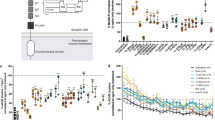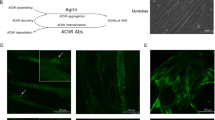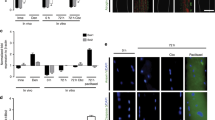Abstract
MYASTHENIA gravis is a disease of impaired neuromuscular transmission (for review see ref. 1), which probably results from a reduced number of acetylcholine (ACh) receptors in the muscle membrane2. Myasthenia is thought to be an autoimmune disease1, in part because most myasthenia patients have circulating antibody to the receptor3,4. Specific antibodies can increase the turnover and reduce the amount of surface proteins5, including ACh receptors6–8, on cells in tissue culture. Because such an effect could contribute to the decrease of ACh receptors found in myasthenia, we have investigated the effect of anti-receptor antibodies on the turnover of ACh receptors in innervated and denervated muscles of adult rats. Two forms of ACh receptor are found in mammalian muscle. Junctional receptors are densely packed and highly localised at motor endplates9–11, while extrajunctional receptors are found in developing and denervated adult muscles at low density over the entire muscle surface10–12. The two forms of receptors are almost identical molecules but can be distinguished both in situ and after purification (for discussion, see ref. 13). Differences in isoelectric point14 and immunological properties (ref. 15 and unpublished results of C.B.W. and Z.W.H.) suggest that they have slight structural differences. One important difference between these forms of receptors is their stability in the membrane. Extrajunctional receptors undergo continual turnover with a half-life of about 14–18 h in both developing and denervated adult muscles16–18. In contrast junctional receptors are much more stable and have not previously been shown to turn over, although their half-life in vivo has been estimated to exceed 6 d (refs 16 and 18). We report here that junctional receptors can turn over and that antireceptor antibodies increase the degradation of both junctional and extrajunctional receptors in adult muscle.
This is a preview of subscription content, access via your institution
Access options
Subscribe to this journal
Receive 51 print issues and online access
$199.00 per year
only $3.90 per issue
Buy this article
- Purchase on Springer Link
- Instant access to full article PDF
Prices may be subject to local taxes which are calculated during checkout
Similar content being viewed by others
References
Drachman, D. B. New Engl. J. Med. 298, 136–142 (1978).
Fambrough, D. M., Drachman, D. B. & Santyamurti, S. Science 182, 293–295 (1973).
Appel, S. H., Almon, R. R. & Levy, N. New Engl. J. Med. 293, 760–761 (1975).
Lindstrom, J. M., Seybold, M. E., Lennon, V. A., Whittingham, S. & Duane, D. D. Neurology, Minneapolis 26, 1054–1059 (1976).
Bretscher, M. S. & Raff, M. C. Nature 258, 43–49 (1975).
Appel, S. H., Anwyl, R., McAdams, M. W. & Elias, S. Proc. natn. Acad. Sci. U.S.A. 74, 2130–2134 (1977).
Heinemann, S., Bevan, S., Kullberg, R., Lindstrom, J. & Rice, J. Proc. natn. Acad. Sci. U.S.A. 74, 3090–3094 (1977).
Kao, I. & Drachman, D. B. Science 196, 527–529 (1977).
Miledi, R. J. Physiol., Lond. 151, 24–30 (1960).
Axelsson, J. & Thesleff, S. J. Physiol., Lond. 147, 178–193 (1959).
Hartzell, H. C. & Fambrough, D. M. J. gen. Physiol. 60, 248–262 (1972).
Diamond, J. & Miledi, R. J. Physiol., Lond. 162, 393–408 (1962).
Brockes, J. P., Berg, D. K. & Hall, Z. W. Cold Spring Harb. Symp. quant. Biol. 40, 253–262 (1975).
Brockes, J. P. & Hall, Z. W. Biochemistry 14, 2100–2106 (1975).
Almon, R. R. & Appel, S. H. Biochim. biophys. Acta 393, 66–77 (1975).
Berg, D. K. & Hall, Z. W. J. Physiol., Lond. 252, 771–789 (1975).
Devreotes, P. N. & Fambrough, D. M. J. Cell Biol. 65, 335–358 (1975).
Chang, C. C. & Huang, M. C. Nature 253, 643–644 (1975).
Merlie, J. P., Changeux, J. P. & Gros, F. Nature 264, 74–76 (1976).
Froehner, S. C., Reiness, C. G. & Hall, Z. W. J. biol. Chem. 252, 8589–8596 (1977).
Lennon, V. A., Lindstrom, J. M. & Seybold, M. E. Ann. N.Y. Acad. Sci. 274, 283–299 (1976).
Engel, A. G., Lambert, E. H. & Howard, F. M., Jr Mayo Clinic Proc. 52, 267–280 (1977).
Brockes, J. P. & Hall, Z. W. Biochemistry 14, 2092–2099 (1975).
Author information
Authors and Affiliations
Rights and permissions
About this article
Cite this article
REINESS, C., HALL, Z. & WEINBERG, C. Antibody to acetylcholine receptor increases degradation of junctional and extrajunctional receptors in adult muscle. Nature 274, 68–70 (1978). https://doi.org/10.1038/274068a0
Received:
Accepted:
Published:
Issue Date:
DOI: https://doi.org/10.1038/274068a0
This article is cited by
-
Receptors to agglutinin fromDolichus biflorus (DBA) at the synaptic basal lamina of rat neuromuscular junction
Cell and Tissue Research (1987)
-
Induction of the morphologic changes of both acute and chronic experimental myasthenia by monoclonal antibody directed against acetylcholine receptor
Acta Neuropathologica (1984)
-
Denervated endplates have a dual population of junctional acetylcholine receptors
Nature (1981)
-
Acetylcholine receptors in organ-cultured human muscle fibres
Nature (1979)
Comments
By submitting a comment you agree to abide by our Terms and Community Guidelines. If you find something abusive or that does not comply with our terms or guidelines please flag it as inappropriate.



